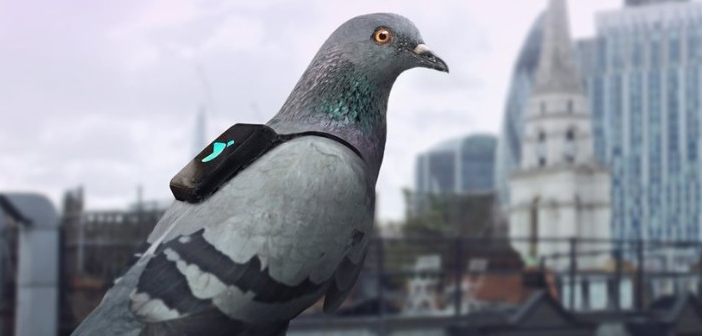Flying squad reporting in real time on the capital’s air pollution
Pigeons wearing air sensors connected to Twitter have been deployed to fly above London and monitor air quality.
Plume Labs, which offers mobile application the Plume Air Report, an urban weather forecast for air pollution with over 150,000 downloads worldwide, has created small, very lightweight sensors for pigeons to wear as they fly over the city.
This week in London the company has launched the first ever flock of pollution-monitoring pigeons, the Pigeon Air Patrol, to monitor air quality in the capital and report back via Twitter, mapping pollution in the city.
It has partnered with global marketing and technology agency DigitasLBi, and Twitter UK, to equip pigeons with little backpacks carrying the ultra-light pollution sensing technologies, to track air quality all around London.
Plume Labs CEO, Romain Lacombe, commented: “Air pollution is a huge environmental health issue, killing 10,000 people every year in London alone. Putting air sensors on the back of pigeons goes beyond raising awareness of this problem and helps Londoners understand the impact of pollution in an accessible, tangible and immediate way.”
Additionally, Plume Labs is now looking to connect Londoners to its Pigeon Air Patrol and ground-based network of 12 air quality monitoring stations in central London, with a human air pollution monitoring network.
Starting in June 2016, Plume Labs is running an experiment that will see 100 Londoners wear a sensor on their clothes, dog lead or whatever is available, to create a moving live map of the capital’s air quality.
The sensors track the pollutant gases that matter for human health: NO2 (diesel and traffic); O3 (photochemical transformation of urban pollutants); and Volatile Organic Compounds (indoor pollutants from household chemicals).
They are ultra-light, miniature and wearable to help users track pollution wherever they go, and connect to the wearer’s phone to send alerts and let the user know when they are exposed.
The company’s team will produce and deliver the sensors, manage the crowd-sensing platform and analyse the anonymous data the beta group of users will collect to provide a live map of air quality in London.
Also, scientists from Imperial College London will monitor and support the experiment to learn as much as possible from this new way to measure and avoid air pollution in the city. The company is currently crowdfunding to make this experiment happen: http://www.crowdfunder.co.uk/crowdsource-air-pollution-in-london





